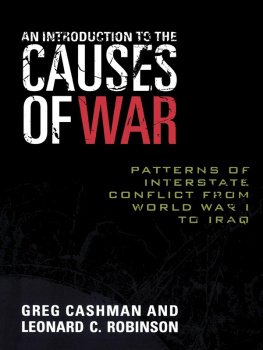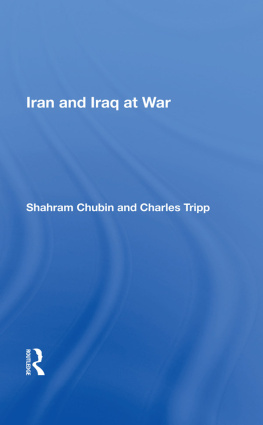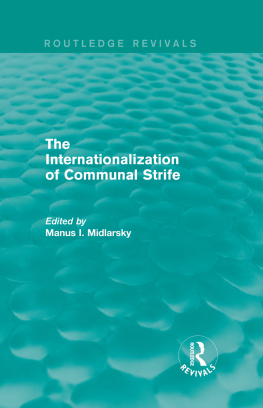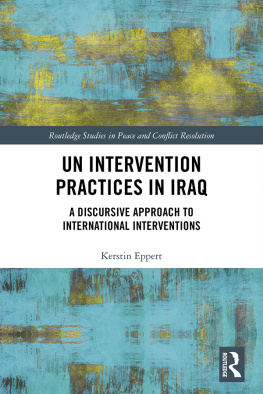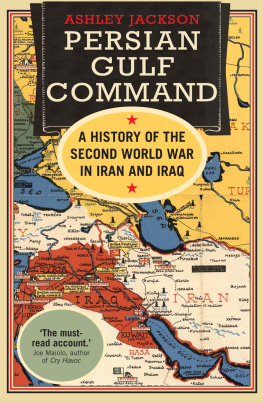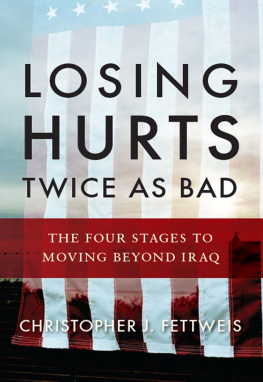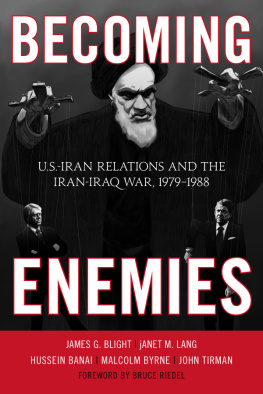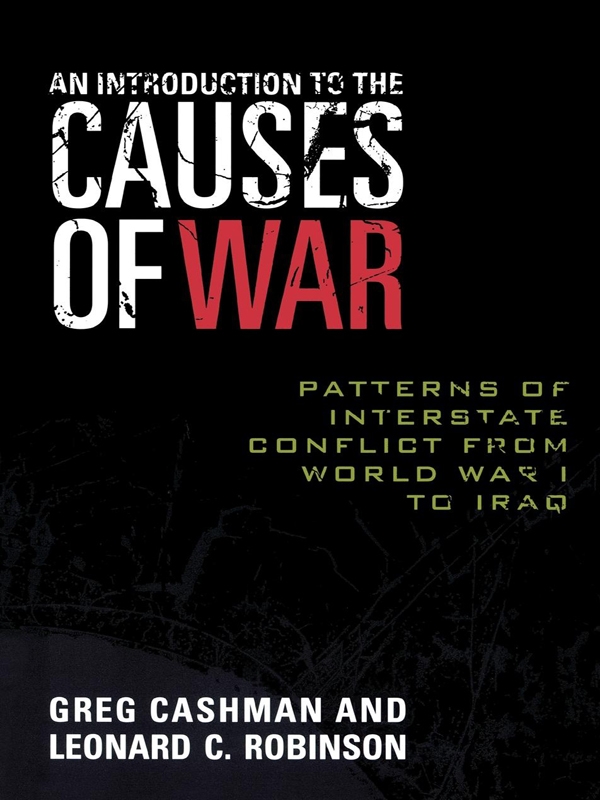Greg Cashman is professor in the Department of Political Science at Salisbury University in Salisbury, Maryland, where he is the program coordinator for International Studies. He is the author of What Causes War? An Introduction to Theories of International Conflict. He received his Ph.D. from the Graduate School of International Studies at Denver University.
Leonard C. Robinson is associate professor in the Department of Political Science at Salisbury University in Salisbury, Maryland. He has published articles on Middle East politics in Arab Studies journal and the Muslim World. He received his Ph.D. from the Department of Political Science at the University of Utah.
References
Allen, Mike. 2004. Management Style Shows Weaknesses. Washington Post, June 2, A6.
Allison, Graham. 1971. Essence of Decision: Explaining the Cuban Missile Crisis . Boston: Little, Brown.
Amin, Agha Humayun. 2000. The Pakistan Army from 1965-1971. Defence Notes. On line at www.defencejournal.com/2000/nov/pak-army.html (June 21, 2003).
. 2001. The 1971 War: An Examination of the Strategic Concept of War. Defence Notes . On line at www.defencejournal.com/2001/jan/1971-war.html (June 21, 2003).
Andersen, Roy R., Robert F. Seibert, and Jon G. Wagner. 1998. Politics and Change in the Middle East . 5th ed. Upper Saddle River, N.J.: Prentice-Hall.
Aruri, Naseer H. 1988. Palestinian Nationalism Since 1967: An Overview. In The ArabIsraeli Conflict: Two Decades of Change , edited by Yehuda Lukacs and Abdallah M. Battah, 71-82. Boulder, Colo.: Westview Press.
Ayoob, Mohammad. 1995. The Third World Security Predicament: State-making, Regional Conflict, and the International System . Boulder, Colo.: Lynne Rienner.
Baghdadi, Abdul Latif. 1977. Mudhakkirat (Memoirs). Cairo: al-Maktab al Hadith.
Bajpai, Shankar K. 2003. Untangling India and Pakistan. Foreign Affairs (May-June): 112-26.
Bamford, James. 2004. A Pretext for War . New York: Doubleday.
Barstow, David, William Broad, and Jeff Garth. 2004. How the White House Embraced Disputed Arms Intelligence. New York Times , October 3. On line at www.nytimes.com/2004/10/03/international/middleeast/03tube.html (October 3, 2004).
Beasley, W. G. 1987. Japanese Imperialism, 1898-1945 . Oxford: Oxford University Press.
Bennett, D. Scott, and Allan C. Stam. 2004. The Behavioral Origins of War . Ann Arbor: University of Michigan Press.
Bergus, Douglas C. 1996. The View from Washington. In The Six-Day War: A Retrospective , edited by Richard B. Parker, 189-236. Gainesville: University Press of Florida.
Bickerton, Ian J., and Carla L. Klausner. 1998. A Concise History of the Arab-Israeli Conflict . 3rd ed. Upper Saddle River, N.J.: Prentice-Hall.
Bill, James A., and Robert Springborg. 1993. Politics in the Middle East . New York: Harper Collins.
Bix, Herbert. 2000. Hirohito and the Making of Modern Japan . New York: Harper Collins.
Blainey, Geoffrey. 1973. The Causes of War . New York: Free Press.
Blix, Hans. 2004. Disarming Iraq . New York: Pantheon.
Blood, Peter R., ed. 1995. Pakistan: A Country Study . 6th ed. Washington, D.C.: Federal Research Division, Library of Congress.
Boot, Max. 2004. Neocons. Foreign Policy 140:20-28.
Bowden, Mark. 2005. Wolfowitz: The Exit Interviews. Atlantic Monthly , July/August, 110-22.
Brecher, Michael. 1980. Decisions in Crisis: Israel, 1967 and 1973. Berkeley and Los Angeles: University of California Press.
Brooks, Stephen, and William Wohlforth. 2002. American Primacy in Perspective. Foreign Affairs 81 (4): 20-33.
Brown, James, and William P. Snyder. 1985. The Iran-Iraq War: Introduction. In The Regionalization of Warfare, edited by James Brown and William P. Snyder, 119-25. New Brunswick, N.J.: Transaction Books.
Brown, L. Carl. 1996. Origins of the Crisis. In The Six-Day War: A Retrospective, edited by Richard B. Parker, 13-73. Gainesville: University Press of Florida.
Brown, L. Carl, and Richard B. Parker. 1996. Introduction. In The Six-Day War: A Retrospective , edited by Richard B. Parker, 1-12. Gainesville: University Press of Florida.
Brown, W. Norman. 1972. The United States and India, Pakistan, and Bangladesh . 3rd ed. Cambridge: Harvard University Press.
Bueno de Mesquita, Bruce. 1981. The War Trap . New Haven: Yale University Press.
Burke, S. M. 1973. Pakistans Foreign Policy: An Historical Analysis . Oxford: Oxford University Press.
Burki, Shahid Javed. 1986. Pakistan: A Nation in the Making . Boulder, Colo.: Westview Press.
Burrough, Bryan, Evgenia Peretz, David Rose, and David Wise. 2004. The Path to War. Vanity Fair , May.
Buruma, Ian. 2003. Inventing Japan. New York: Modern Library.
Butow, Robert J. C. 1961. Tojo and the Coming of the War. Princeton: Princeton University Press.
Byman, Daniel, and Kenneth Pollack. 2001. Let Us Now Praise Great Men. International Security 25 (4): 107-46.
Calleo, David. 1978. The German Problem Reconsidered. Cambridge University Press.
Carr, E. H. 2001. The Twenty Years Crisis. New York: Palgrave.
Cashman, Greg. 1993. What Causes War? An Introduction to Theories of International Conflict. New York: Lexington.
Chawla, Shalini. 2001. Pakistans Military Spending: Socio-Economic Dimensions. Strategic Analysis 25 (August).
Checkel, Jeff. 1993. Ideas, Institutions, and the Gorbachev Foreign Policy Revolution. World Politics 45:271-300.
Choucri, Nazli, and Robert North. 1975. Nations in Conflict. San Francisco: W. H. Freeman.
Choudhury, G. W. 1974. The Last Days of United Pakistan. Bloomington: Indiana University Press.
. 1975. India, Pakistan, Bangladesh, and the Major Powers: Politics of a Divided Sub-Continent. New York: Free Press.
Chubin, Shahram, and Charles Tripp. 1988. Iran and Iraq at War. Boulder, Colo.: Westview Press.
Churchill, Randolph S., and Winston S. Churchill. 1967. The Six Day War. Boston: Houghton Mifflin.
Clarke, Richard. 2004. Against All Enemies: Inside Americas War on Terror. New York: Free Press.
Claude, Inis, Jr. 1962. Power and International Relations. New York: Random House.
Cobban, Helena. 1984. The Palestinian Liberation Organization. Cambridge: Cambridge University Press.
Cohen, Stephen P. 2002. The Nation and the State of Pakistan. Washington Quarterly 25 (3): 109-22.
Commission on the Intelligence Capabilities of the United States Regarding Weapons of Mass Destruction (CIC). Laurence Silberman and Charles Robb, co-chairs. 2005. Case Study: Iraq. In Whitney, WMD Mirage, 402-554.
Crowley, James. 1974. A New Asian Order: Some Notes on Prewar Japanese Nationalism. In Japan in Crisis, edited by B. Silberman and H. D. Harootunian. Princeton: Princeton University Press.
Daalder, Ivo, and James Lindsay. 2003. America Unbound: The Bush Revolution in Foreign Policy. Washington, D.C.: Brookings Institution.
Danner, Mark. 2005. The Secret Way to War. New York Review of Books, June 9, 70-74.
Dassel, Kurt. 1998. Civilians, Soldiers and Strife: Domestic Sources of International Aggression. International Security 23 (1): 107-40.
Dawisha, Adeed. 1980. Iraq: The Wests Opportunity. Foreign Policy 41:134-53.
. 2000. Arab Nationalism and Islamism: Competitive Past, Uncertain Future. International Studies Review 2 (Fall): 79-90.
Desch, Michael. 1998. Culture Clash: Assessing the Importance of Ideas in Security Studies. International Security 23 (1): 141-70.
Deutsch, Karl, and Richard Merritt. 1965. Effects of Events on National and International Images. In International Behavior, edited by Herbert Kelman, 132-87. New York: Holt, Rinehart and Winston.

